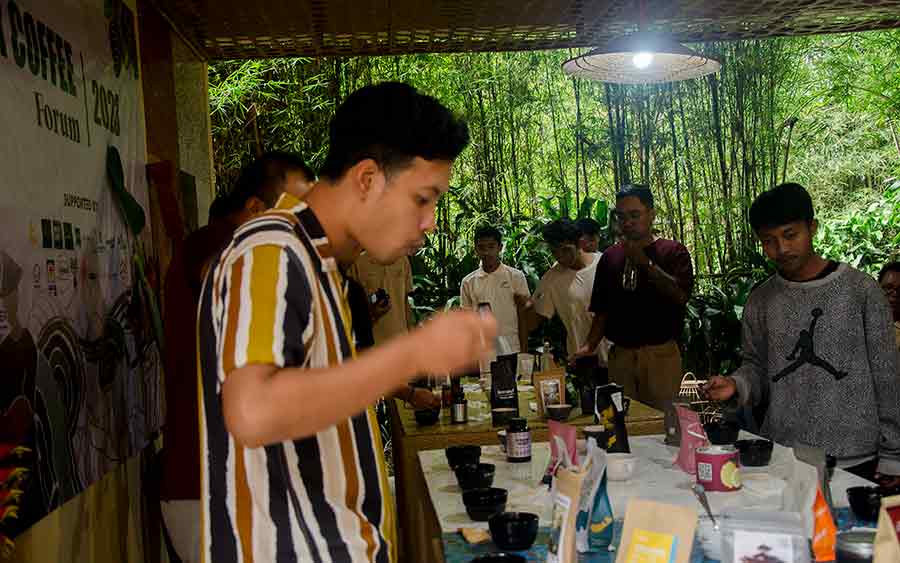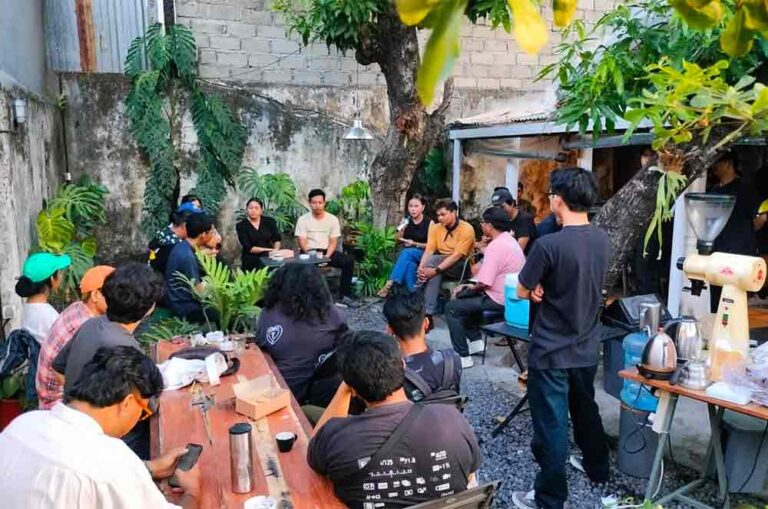That morning, cool air and warm sunshine accompanied the journey to Munduk Village, Banjar District, Buleleng. This is the journey to a gathering event for coffee business people in Bali, the Munduk Coffee Forum.
From the direction of Sangeh, towards Muduk Village, you must pass through the stunning views of three charming lakes: Lake Beratan, Lake Buyan, and Lake Tamblingan. A perfect morning.
Arriving at the location, it was 9 a.m. Apparently, the event venue was at a beautiful resort with an environmentally friendly concept, Munduk Monding Plantation Nature Resort.
It’s a bit confusing too, because the resort area is connected by a corridor fenced with green plants that stretches, twists, and branches here and there.
A friendly staff member approached and took me by buggy to the Munduk Coffee Forum location. It seems that the vehicles in this area are only powered by electricity because you never hear the sound of a motorcycle engine along the corridor.
No fewer than twenty people had gathered at the location. There are coffee farmers, post-harvest coffee processors, coffee shops and roastery owners.
The event began with a tour around the coffee plantation, which is in the resort area, as well as where the harvested coffee is processed. Apart from that, you can also see the resort’s waste water treatment system, the Ecological Waste Water Treatment Facility, and cool plastic waste processing.
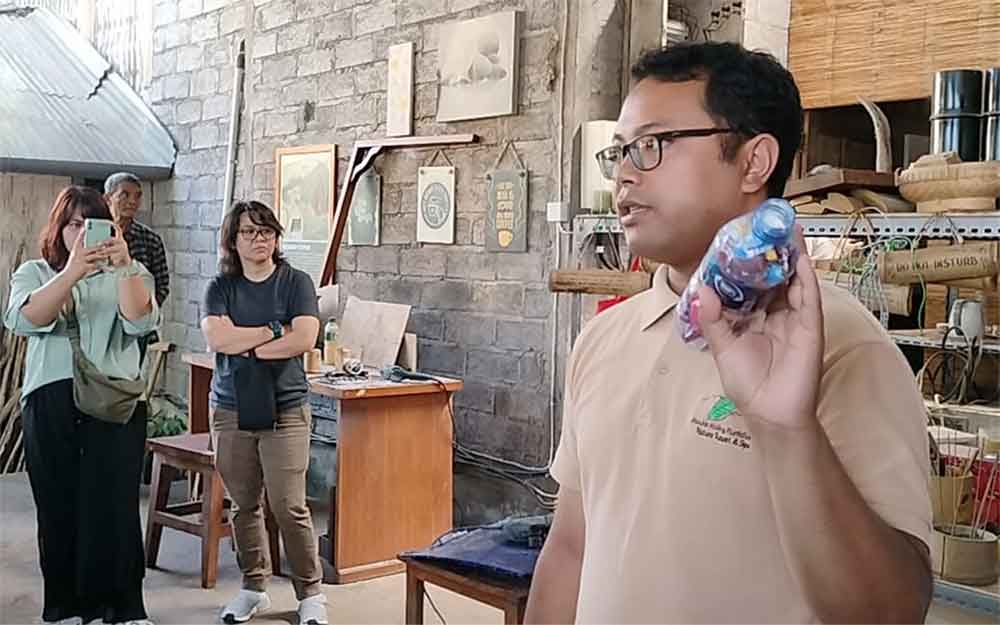
A resort that is serious about maintaining its natural environment so that it remains sustainable.
The sharing event was attended by two senior coffee business people, I Wayan Arca from Ulian, Kintamani and Putu Ardana from Tamblingan Lake. Apart from that, there was also a representative from Su-Re.co, an institution engaged in empowering communities for adaptation and mitigation of climate change.
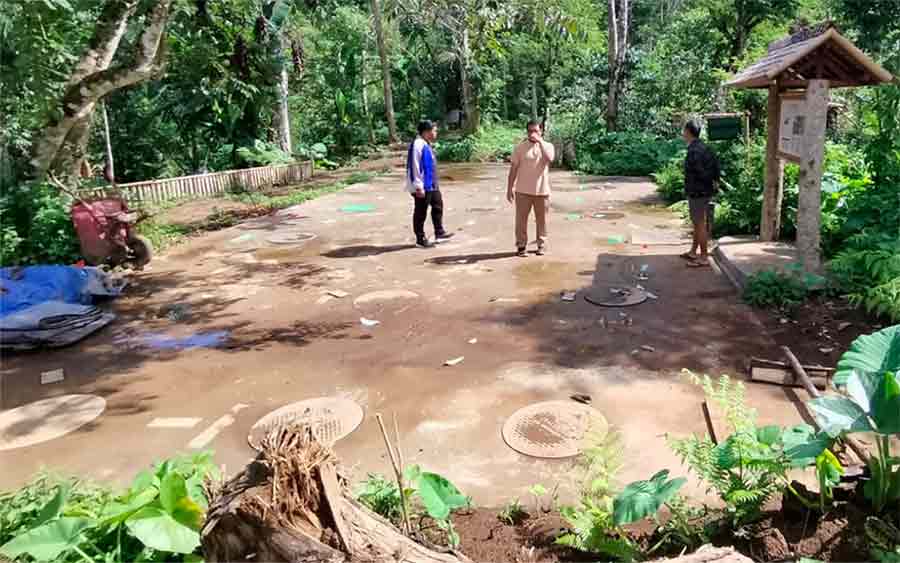
I Wayan Arca is the second generation after his father started the coffee business in 1980. However, he did not want to completely change his father’s business, which at that time only pursued the highest possible productivity of coffee plantations. But I Wayan Arca made improvements to several things that were considered crucial.
He continued his father’s business in 2008 by gradually replacing coffee varieties with Arabica coffee plants, which sell better on the market.
Then, with patience, invite local farmers to adopt good agricultural methods. One of them is by teaching how to harvest coffee by only picking coffee cherries that are already red.
“It took approximately five years to make farmers in Ulian aware to only pick red cherries coffee,” he said.
He did not stop there. I Wayan Arca also invited the surrounding farming community to start paying attention to the quality of their farm soil. By avoiding the use of chemical fertilizers and replacing them with manure or compost.
Also, by implementing a coffee plant regeneration method, apart from increasing the productivity and quality of coffee, it is also possible to rest the garden soil so that it does not become overexploited.
Coffee plants need approximately 3 years from the planting period to start being productive. All this time is an opportunity to restore soil nutrients so that its fertility recovers.
“I don’t want to pass on land that is toxic and damaged, due to overexploitation of farms, to the next generation,” he said.
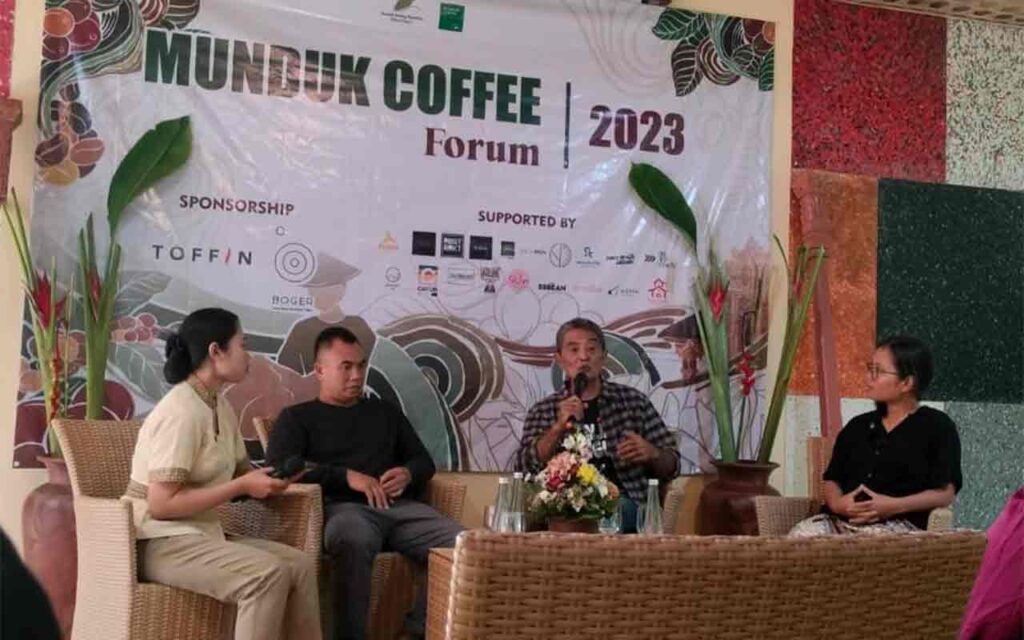
Meanwhile, Putu Ardana shared his experience encouraging farming communities in the Lake Tamblingan area to behave organically. Not just farming organically.
He emphasized the importance of returning farmers’ mentality from a consumer mentality, which is used to expecting subsidies from the government, back to an independent producer mentality.
Encouraging farmers to return to coffee farming, as in the past the Munduk area was famous as a coffee center. Because coffee farming is accompanied by shade plants, the landscape of the Tamblingan Lake area can be protected from landslides and the threat of reduced spring discharge.
“I invite farming communities to plant coffee without chemical fertilizers and harvest red-picked coffee. That’s all,” he said, telling how he persuaded farmers to start gardening while still preserving nature.
Now, Putu Ardana has created the “Blue Tamblingan” brand for coffee products from plantations in the Tamblingan Lake area.
Meanwhile, Oktaviana Winda from Surco (Su-re.co) shared her experience in assisting several community groups in various regions of Indonesia. Surco explained the importance of agricultural patterns that adopt environmentally-based adaptation methods.
Ecosystem-based adaptation involves integrating local values and adapting to climate change. One of them is the agroforestry farming method, which increases land cover with shade trees, bringing a positive impact on the environment. Such as improving soil quality, returning forest animals, and maintaining soil structure from potential landslides.
Apart from sharing knowledge and experiences, participants were invited to taste 32 coffee products from coffee plantations and processors in Bali. This coffee cupping session is like a showcase for the taste of Balinese coffee which is very rich and unique. Tremendous potential to be on par with famous coffees from abroad.
“Our coffee actually only needs to be refined from upstream to downstream so that there is standardization and consistency. So it is not just a coffee with rich flavor, but also wow!” said Rifka, one of the roasters from Great Brew Denpasar who took part.
It didn’t feel like it was already late afternoon. According to Elman from Munduk Monding Plantation, this event, which is being held for the first time, will be held more often. Munduk Coffee Forum brings together coffee industry stakeholders and farmers. It is like a chat room for the participants. The hope is that local farmers will gain broader insight and networks about coffee and the industry.
“This is also a manifestation of Munduk Coffee Plantation’s mission to have a direct or indirect impact on the community and surrounding environment,” said Elman.
The potential for Balinese coffee is still very large. It requires solidarity and joint efforts from all stakeholders to take it in the right direction.
Because Bali is not only about exploiting its exotic culture and nature for tourism. It has been proven that this carelessness has torn Bali apart mercilessly.
Bali can become a center for quality coffee while also supporting the preservation of its culture and nature.

